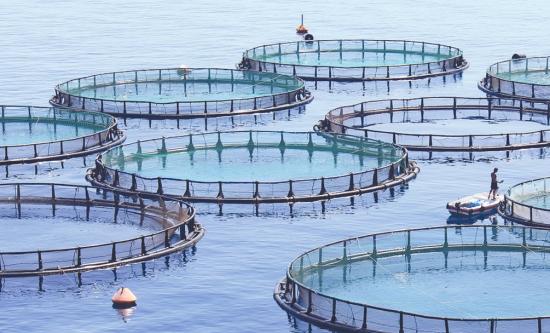Fish Farms in Lake Michigan?
May 13, 2016

Aquaculture in the Great Lakes Could Be the Next Big Environmental Fight
Debate over a fish farm on the Au Sable River has reverberated, generating a broader discussion about aquaculture.
Should fish farms be allowed in the Great Lakes?
Competing bills have been introduced in the state legislature, one that would ban fish farms on the big lakes outright and one that would allow as many as 10 of the facilities to be established in Michigan. The bills were introduced late last year and seem to be languishing.
Open-net aquaculture in the Great Lakes is perhaps a more complicated issue than fish farms on the shore of a river. Because they are located in open water, it’s more challenging to keep nutrients and fish waste from spreading. Great Lakes fish farms would be either a windfall of sustainable food or a recipe for lake-killing algae blooms and fish disease, depending on which side you ask.
Liz Kirkwood believes the discussion is dead in the water.
The executive director of FLOW (For the Love of Water) in Traverse City, Kirkwood said fish farming violates a central legal tenet of the Great Lakes: They are held in the public trust and cannot be taken for private enterprise.
“I think that our current laws, as they are now, will never authorize a use like open pen aquaculture because it’s a private use that will fundamentally destroy the public water resource,” Kirkwood said.
Dan Vogler, operator of a Grayling fish hatchery and the president of the Michigan Aquaculture Association, said aquaculture on the Great Lakes could be an incredible economic stimulus that would provide the country with an excellent source of protein.
He said people shouldn’t be afraid of aquaculture, even if they see it as tinkering a bit with the biology of the Great Lakes. The modern history of the lakes is a history of tinkering, he said.
“The Canadians have 30 years of experience in Lake Huron,” Vogler said. “It’s not like we don’t have any information here. There’s a ton of good information in Canada.”
Kirkwood noted that there have been algae blooms, escaped fish and disease problems associated with the nine Canadian fish farms in Lake Huron. Vogler said the problems in Canada were addressed by adjusting the way the farms operate.
Kirkwood said it would be worth considering diversion of Great Lakes water for closed-system fish farms, facilities that are not connected to lakes or rivers, as long as it was done responsibly and water was recycled.
Retired river guide Charlie Weaver, a member of the Sierra Club and the Northern Michigan Environmental Action Council, thinks that’s a great idea. Shuttered industrial buildings across Michigan could be turned into fish factories.
“Michigan is sitting on a gold mine; with all of its economic woes, there’s a gold mine there in the lakes and this state, if it does it right, is going to be one of the richest states in the world,” he said. “…If it does it right, if it doesn’t give it away or pollute it.”
Trending

The Valleys and Hills of Doon Brae
Whether you’re a single-digit handicap or a duffer who doesn’t know a mashie from a niblick, there’s a n... Read More >>
The Garden Theater’s Green Energy Roof
In 2018, Garden Theater owners Rick and Jennie Schmitt and Blake and Marci Brooks looked into installing solar panels on t... Read More >>
Earth Day Up North
Happy Earth Day! If you want to celebrate our favorite planet, here are a few activities happening around the North. On Ap... Read More >>


